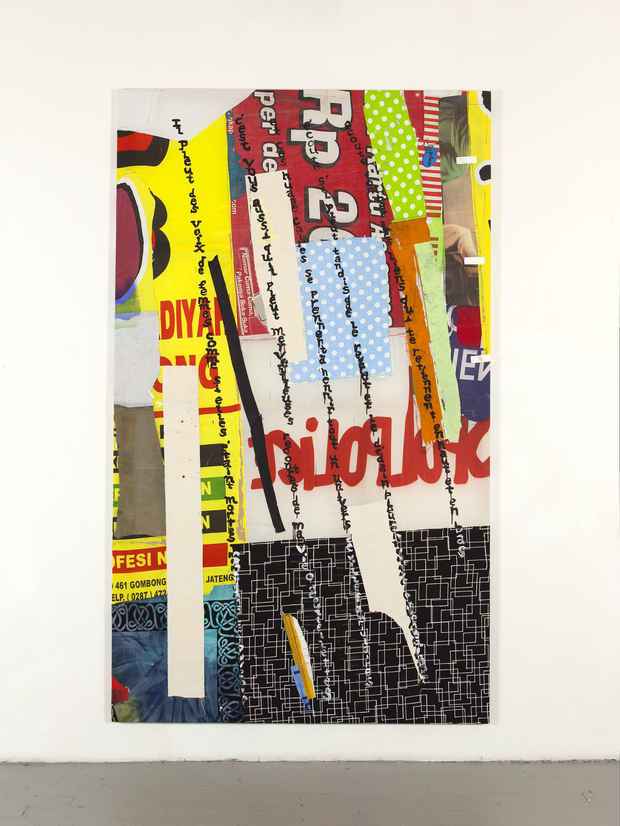Joe Fyfe “But a Flag Has Flown Away”
Nathalie Karg

[Image: Joe Fyfe "Il Pleut" (2018) canvas, nylon, cotton, linen, acrylic, 108 x 64 in.]
This event has ended.
The title of the exhibition refers to the materiality, lightness and distance of my work. It is a line from “Exiled Grace,” an entry in Calligrammes (1913-1916) by Guillaume Apollinaire, a book of poems written while he served in World War I.
Each painting utilizes a poem from the book. Il Pleut came about capriciously. I imposed the Apollinaire poem over the variegated surface of the support. It felt cheeky to apply this beloved modernist poem—as important to literary history as art history—as an organizing motif for a painting.
When I finished the Il Pleut painting, I had to understand it. I thought of the Giorgio Agamben essay, “What is the Contemporary?” I had been wondering, how do you feel the present? How do you frame it? Agamben’s mysterious conclusion was that an anachronistic relationship to the present was necessary to perceive the contemporary.
Soon after I discovered the Marxist cultural critic Mark Fisher, now deceased, who described in his book, Ghosts of My Life “the slow cancellation of the future” how neo-liberal capitalism has “systematically deprived artists of the resources necessary to produce the new” resulting in art that tended towards “retrospection and pastiche.”
Similarly, perhaps, I have always tried to achieve something like a quality of stasis in my work, as if I had all the time in the world—Baudelaire perusing the Salon—in opposition to the compulsive, purposeless dynamism of capitalism. I wished not to prod nor distract the viewer, but to problematize the relationship between the viewer and the work. I sought an anachronistic relationship to the present as way of moving outside of history, or the post-history bubble of cyber-consumerism.
Other aspects of the Calligrammes paintings utilize different models. Their compositions, for example are similar to the paintings of the French painter Claude Viallat, whose work marries that of Matisse and Brecht. In his work, painted patterns are introduced over re-purposed fabric objects.
Another model for this series was the Robert Altman film Short Cuts in which the plots of a half-dozen Raymond Carver stories are yanked from their settings in the Pacific Northwest and cobbled into an episodic narrative set in Los Angeles. Here, Altman demonstrated that to genuinely respect the material you borrow you must be ruthless with it.
Apollinaire called himself “a traveling spectator of the world,” reflecting the fabric, flags and signage that make up my surfaces have been collected during international travels. But I know very little French. So, even though I had translations at hand, my experience of painting the texts has been an appreciation of the words for their appearance.
The 100th anniversary of the Armistice occurred just as I finished up this series. There is portrait of Apollinaire by Picasso that serves as a frontispiece in the original edition, in which the poet is seen with a head wound wrapped in bandages. The canvas strips adhered to the surfaces of the paintings correspond to the bandages wrapped around Apollinaire’s head.
- Joe Fyfe
Joe Fyfe (b. 1952 in New York, New York) is based in New York City. He repurposes found materials like kites, signs, and banners to reveal the poetic beauty within overlooked everyday objects. Culled from daily refuse—particularly that of impoverished areas in Southeast Asia—Fyfe’s work documents regional transitions and globalization. They are deliberately nonrepresentational, allowing materials to dictate form and come together on their own, rather than adhere to a preconceived artist’s vision. Fyfe received his BFA in 1976 from the University of the Arts in Philadelphia, Pennsylvania. He has been publishing art criticism and essays extensively for the past twenty years and is the recipient of numerous residencies and awards, including a Fulbright Scholarship (2006-07), a Guggenheim Fellowship (2008), and a Pollock Krasner Foundation Grant (2004, 2015).
Media
Schedule
from January 04, 2019 to February 10, 2019
Opening Reception on 2019-01-13 from 18:00 to 20:00